Stories
David Elman
1953-2018
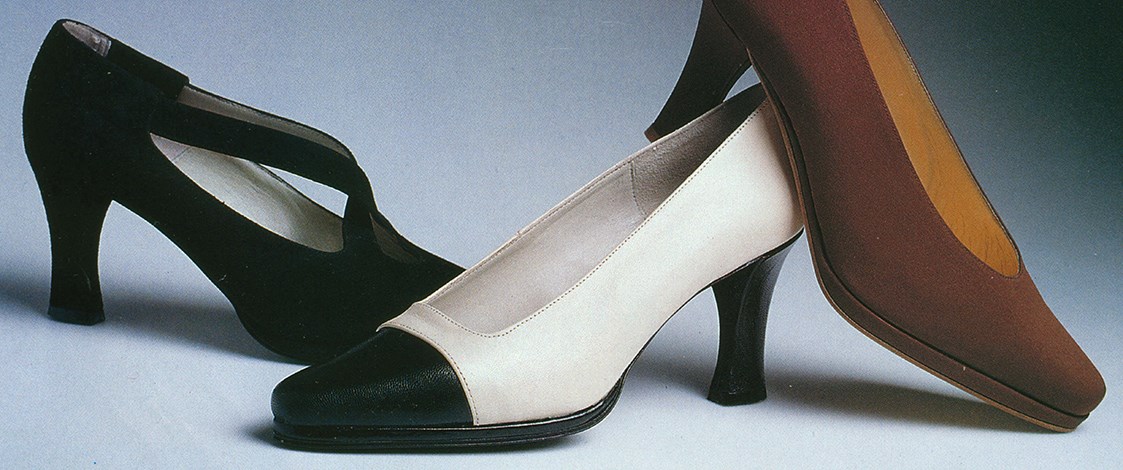
Since 1953, the name David Elman has been synonymous with elegant shoes. Women who were teenagers in the 1950s often associate the label with their first high heels. "They were pale green leather sling-backs with almond toes," remembers one,", and cost more money than I made in a week. I had to save up for them, but they were worth every penny."
Raymond Monks, the founder of David Elman, came from a shoe-making family. His grandfather was involved in shoe manufacturing in England and his father William, a clicker (leather cutter) by trade, opened a factory in Parnell in Auckland in the 1930s, producing men’s shoes and, during WWII, regulation boots for the army. Raymond worked alongside his father and four brothers in the business until setting up on his own in a small factory in Great North Road, Grey Lynn, with the intention of making fashion shoes for women.
Raymond’s son Brooke has recollections of sitting at the kitchen table when he was about ten, listening to the family discuss what to call the new business. "Dad played the violin and a Ukrainian-born American violinist he much admired was called Mischa Elman. He also liked the name David. That’s how the name David Elman came about."
From the outset, the emphasis was on quality materials, a high level of craftsmanship, exemplary attention to detail, not being too flashy and maintaining a balance between comfort and good design. It was also about going the extra mile. David Elman shoes were made in half sizes in A, B and C fittings as well as triple A fittings for women with narrow feet.
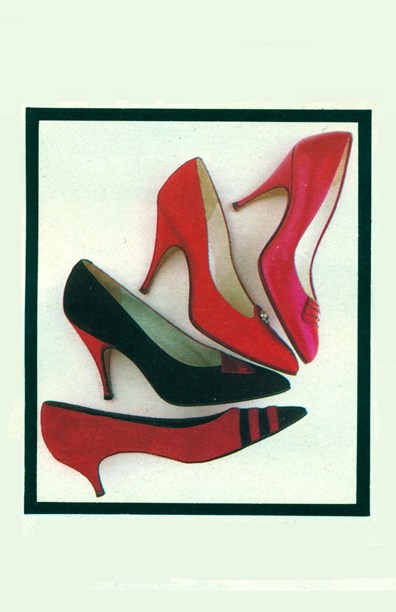
Pointed toes and stiletto heels defined the quintessential 1950s’ shoe. Satin and suede courts by David Elman, mid to late 1950s.
In the early days, David Elman shoes were sold exclusively in Auckland, at John Greer in Vulcan Lane and Remuera, followed by Ashley Ardrey in Wellington, then a few other selected shops around the country. "There were many shoe factories operating in New Zealand post-war," says Brooke Monks. "We were actually one of the smallest. We deliberately restricted the number of outlets stocking the brand to preserve exclusivity."
Warren Smith, who managed John Greer from 1965 until 1975 and later became shop manager for David Elman, a position he retained for 38 years, remembers John Greer as one of Raymond’s major mentors. "John was a cultured Irishman with impeccable taste and a flair for colour. Raymond would bring sample shoes into the salon and get his advice on colour combinations and trims."
Brooke joined his father at David Elman in 1965 when he was 22. He started from scratch, learning how to cut patterns, how to use the machines and how to sell the product. In 1970, to give him a better feel for the business, Raymond sent him to London where he worked in retail for one year at a fashionable shoe store in Chelsea’s King’s Road. "The Beatles were customers," he recalls, "and one of my biggest sales was selling Liberace 11 pairs of shoes." From London, he went to Milan. There, he did a course at Ars Sutoria, a prestigious academy offering tuition in shoe manufacture, pattern-making and shoe design.
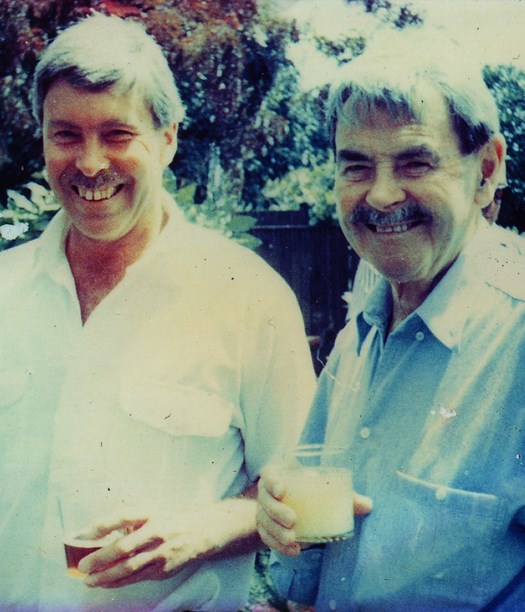
Raymond Monks (right) and Brooke Monks of David Elman. Image © Raymond and Brook Monks.
Following his overseas experience, Brooke made twice-yearly trips to Europe. He attended shoe fairs in Milan, Paris and Dusseldorf, and visited shoe factories in Florence, sourcing ideas, machinery, leather, lasts and shoe components such as heels, inners and soles.
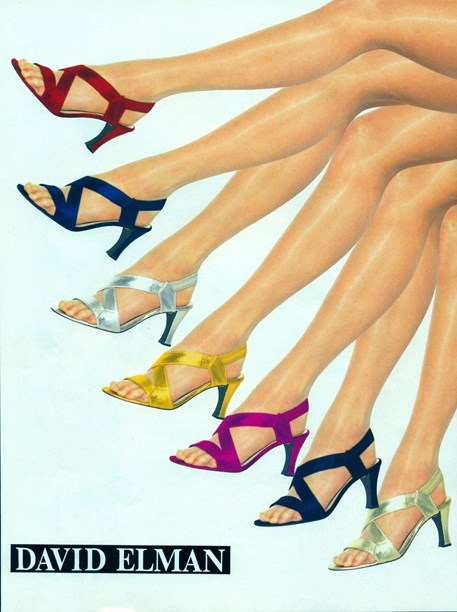
These high-heeled summer sandals in assorted colours and metallics replicated a design by French footwear label Charles Jourdan. As with fashion designers, it was common practice among shoe manufacturers to reinterpret overseas styles for the New Zealand market. Image © David Elman.
In 1980, he and his younger brother Simon opened their own David Elman shoe boutique in Auckland’s Queen Street. Called Cassandre, it was a tiny space - just 35 square metres – staffed by Warren Smith, Verity Monks (Brooke and Simon’s sister) and one other. Sales exceeded all expectations, leading to the opening of two more boutiques - Carrano in Remuera and Carel in Takapuna - within two years. In 1986, after a period of consolidation, the company opened a further two stores, one in Newmarket (Prada), the other in Hamilton.
To better establish brand identity, the European shop names were eventually changed to David Elman. Eponymous stores were also set up in Christchurch and Dunedin and, in Australia, in Sydney and Melbourne. As the business expanded, the need for more manufacturing space resulted in a move to a 930 square metres factory in Avondale.
The brand’s fashion standing was enhanced by its association with well-dressed society women, seminal fashion figure Paddy Walker and high-profile designers. Vinka Lucas, Michael Mattar, Gus Fisher (El Jay), Patrick Steel and Kevin Berkahn were among the exponents of luxury fashion who referred their clients to David Elman for co-ordinated footwear.
With weddings and evening events in mind, white satin shoes were always kept in stock and these could be hand-dyed to match any outfit. Fabric-covered shoes in other styles, using material supplied by a client or designer, were another option. Kevin Berkahn says it wasn’t unusual for David Elman to make shoes for an entire wedding party – bride, bridesmaids, mothers of the bride and groom. Making a pair of matching shoes cost $25 and delivery was guaranteed within four weeks.
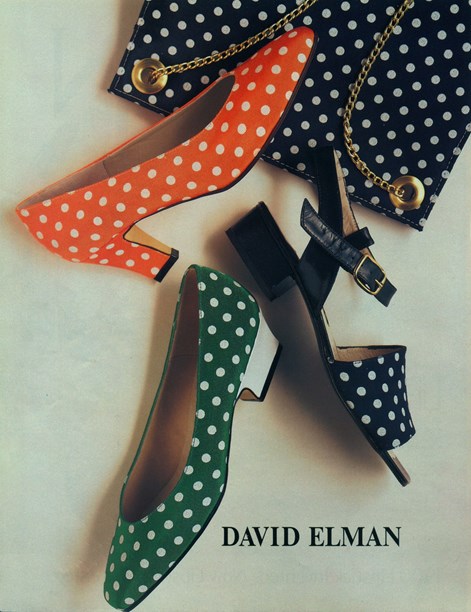
Over the years, David Elman produced a variety of fabric-covered shoes in different styles, often with matching handbags. Grosgrain collection, 1992. Image © David Elman.
Raymond Monks retired in 1987 and Brooke Monks took over the running of the business. Throughout the 1990s, despite increasing competition from cheap shoe imports, it continued to prosper.
When Pieter Stewart started the Corbans (later Wella) Fashion Collections in 1990, she asked David Elman if they could provide footwear for the parade. They willingly obliged, that year and in subsequent years, deriving much benefit from the live television exposure.
They also made the shoes for Paula Ryan’s debut fashion collection, which she showed at New Zealand Fashion Week in 2001, and for her seasonal footwear collections from then on.
David Elman advertisements from the 1990s testify to a cavalcade of shifting shoe shapes, colours, finishing touches and textures. Replacing the lizard, python and water-snake skins of yesteryear were animal prints and mock crocodile patent leathers. High-heeled sandals, little more than a fretwork of delicate strips, recalled the 1950s’ Hollywood starlet, and classic courts appeared in various guises, dressed up in exuberantly coloured leathers and suedes, polka dot grosgrains and houndstooth checks. The loafer and other deftly designed flats proved that, in the right hands, low heels could look stylish and chic.
Throughout the 1990s, David Elman advertisements followed a similar format and presented an overview of each season. Images © David Elman.
By the mid-2000s, with the future of locally manufactured footwear looking even bleaker, it became obvious that for David Elman to survive, the company needed to diversify. Exclusive shoe imports from Italy, Portugal and Spain were added to the mix and sold alongside the David Elman brand in the remaining Elman stores in Auckland and Hamilton.
When the factory finally closed in 2008, Brooke Monks gave some of the machinery to footwear designer Sandy Cooper whose brand, Minnie Cooper, David Elman had been producing for about 15 years. Sandy then opened her own factory and took on six former David Elman employees.
After the closure of the factory, David Elman continued to retail European footwear until this too, became unsustainable. Brooke says constant discounting and other changes, particularly in the electronic world, such as online shopping, made it impossible to compete.
With the closure of the last remaining Auckland store earlier this year and the Hamilton store about to shut its doors, the David Elman story is coming to an end. The brand has been worn and respected by fashion-conscious New Zealand women for three generations. Referring to his wife Sue, who worked with him in the business for 33 years, Brooke Monks says: "Shoes have been our life. I can’t believe it’s over."
Text by Cecilie Geary.
Last published July 2018.